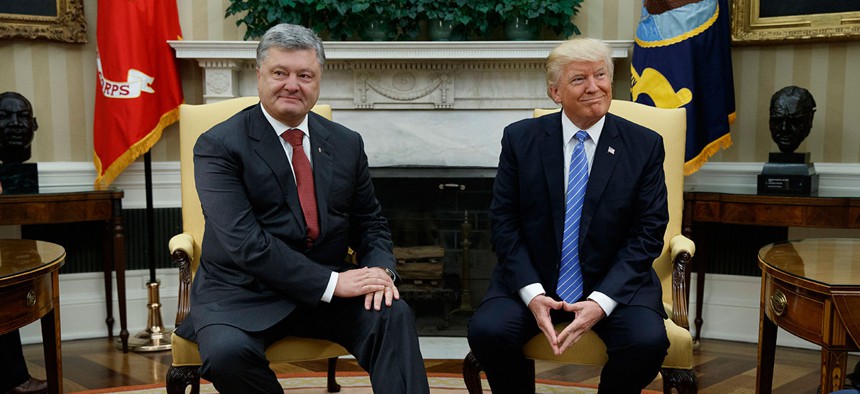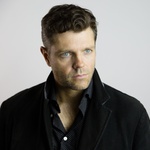Inside the West Wing Tug-of-War Over Russia and Ukraine
The president has been all over the map on Ukraine. The people around him have been much more consistent.
Vice President Mike Pence and other national-security leaders are dragging President Donald Trump along in a growing effort to hold Russia accountable for illegal actions in Ukraine. For evidence of that just look at how two very different people interpreted Tuesday’s meeting in the Oval Office.
As Trump sat for his first photo-op with Ukrainian President Petro Poroshenko, the U.S. Treasury Department unveiled new sanctions aimed at Russian citizens, banks, and other entities that support the Russian soldiers who are – unofficially – attacking the government of Ukraine. After the meeting, a reporter asked Poroshenko whether Trump had discussed the future of the U.S. Russian-sanctions policy. “I think it is obvious. To date, the U.S. adopts additional sanctions almost every day. I consider the position of the United States as a solid, reliable and strategic partner of Ukraine,” said Poroshenko, avoiding any mention of the U.S. president, according to an official readout from his office.
Trump, too, declined the opportunity to take credit for the Treasury Department’s decision. The White House readout of the meeting says only that the two leaders discussed “the peaceful resolution to the conflict in eastern Ukraine and President Poroshenko’s reform agenda and anti-corruption efforts.”
That fits with a pattern. In a now-infamous May 10 meeting in the Oval Office, Trump told Russian Foreign Minister Sergey Lavrov and Ambassador Sergey Kislyak that his “critics cared about the issue” of Ukraine. Trump then asked “the Russians to help resolve the dispute,” an unnamed official told the New York Times.
Asking Russia to help resolve a dispute it began with an illegal invasion is a bit like asking a hostage taker to resolve a hostage situation by, well, keeping the hostages.
People around Trump are increasingly willing to take a harder line.
In February, Trump’s U.N. ambassador Nikki Haley surprised many when she came out swinging hard on the issue of maintaining sanctions against Russia. Traditionally, it’s the role of the UN ambassador to carry the message of the President and sell it to the world. Haley’s strong advocacy for sanctions seemed out of step with Trump, who made a campaign-trail habit of expressing how “nice” it would be if the U.S. “could get along with Russia.” In April, Haley basically confirmed that she was effectively making policy for the administration. “He is not stopping me from beating up on Russia,” she told ABC’s Martha Raddatz. “He's got a lot of things he's doing.”
Read another way: Haley made policy and Trump followed.
Secretary of State Rex Tillerson, too, has pledged support for continued sanctions against Russia even while seeking ways to work with Moscow on “strategic stability.”
But the highest-profile friend of Kiev in the administration is Mike Pence. In February, the vice president used the Munich Security Conference to recommit to the NATO military buildup in Eastern Europe “In the wake of Russian efforts to redraw international borders.”
“With regard to Ukraine," he continued "we must continue to hold Russia accountable and demand that they honor the Minsk Agreements, beginning by de-escalating the violence in eastern Ukraine.”
Later, on May 10 — the same day his boss was revealing classified intelligence to Russians — Pence met with Ukrainian Foreign Minister Pavlo Klimkin elsewhere in the White House. The vice president reiterated his assurances from Munich, emphasizing “unwavering U.S. support for Ukraine’s sovereignty and territorial integrity,” according to a readout of the meeting.
Pence ultimately brought Klimkin into the Oval Office for a photo-op. Unlike the meeting with Lavrov, Trump’s tête-à-tête with Klimkin was not on the President’s official schedule. It seemed, to some observers who watch such diplomatic dances with great interest, like a carefully orchestrated maneuver — by someone — to a send a signal in the right direction. It’s hard to say if Trump got the message.
In a tweet, Trump again emphasized his role as a peacemaker.
Yesterday, on the same day- I had meetings with Russian Foreign Minister Sergei Lavrov and the FM of Ukraine, Pavlo Klimkin.#LetsMakePeace! pic.twitter.com/SPiIrJqI6G
— Donald J. Trump (@realDonaldTrump) May 11, 2017
The tweet was remarkable especially in the way it seemed to treat the countries as two equals involved in a squabble — when in fact, one had acted outside of international law, was still working to destabilize the other, and that there was a multi-party framework to hold one accountable. That agreement, sometimes called the Normandy framework, involves the governments of Ukraine, France, Germany on one side and Russia on the other.
“It seems odd, both in content and style, that a president would signal via Twitter that he is treating the two countries equally without consultation of NATO allies with whom we are joined in sanctions on Russia because of its behavior in Ukraine,” Harvard Kennedy School Prof. Joseph Nye told The Washington Post.
A Ukrainian official, who declined to be named since they were not authorized to speak publicly on behalf of the government, said that Klimkin left that brief meeting with Trump’s assurance that he would not try to undermine that process, or force Ukraine into a situation where it had to make concessions on, say, Crimea. “The end point [of the discussion] was that they are not going to throw us over for co-operation over Syria,” the official said.
Officials in the Office of the Vice President said that account was accurate.
That’s quite a diplomatic development for a meeting that was not even on the President’s official schedule.
How far apart are Trump and Pence on Ukraine? “There is no gap between the President and the Vice President,” Andrea Thompson, the vice president’s national security advisor, said at the 2017 GLOBSEC forum in Bratislava, Slovakia. Sitting next to Klimkin, she also re-affirmed Pence’s support for the territorial integrity of Ukraine.




